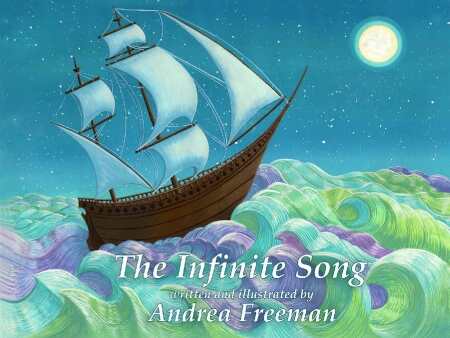The Infinite Song
An Allegorical Tale for Our Times
In The Infinite Song, Andrea Freeman lets there be light shining down equally on religion, myth, and nature.
A creation story that is both secular and accepting, Andrea Freeman’s The Infinite Song uses lovely illustrations and sometimes-successful poetry to send a loving reminder of humanity’s capacity for compassion in the context of our origins in nature.
Beginning with a divine goddess, who creates light and weaves the rest of creation from its rays, The Infinite Song parallels the creation story of Genesis while briefly mentioning evolution and diving into the sorrow of the human condition by discussing our deviation from our origins and our focus on materialism. The inclusion of unicorns, fairies, and elves is curious, but the charming illustration for the page discussing these creatures and the line, “a few souls we haven’t got names for yet,” makes it an imaginative and understandable addition in the context of Freeman’s theme of wonder at the unknown in the world; the book urges exploration of nature’s mysteries. Freeman’s handling of the human diversion from divine origins is deft and acts as a reminder—that can also be interpreted secularly as an allegory—that we find peace through internal means rather than external means.
Freeman’s illustrations are where the book shines. The colorful planets strung across the sky, the bounty of elegant animals, and the sweeping landscapes are especially eye-catching. Though some pages only hold a swirl of color and are consequently vague, the words on the opposing pages imbue meaning into the design.
The rhythm and meter of the text are sometimes hard to follow, and the rhyme scheme is often different from page to page. These issues, and the occasional missing word, can make the book difficult to read aloud for the first time, as is the case in this passage:
“‘The magic of Being
is really worth seeing.
Let there Light
so there can be sight!’
And creating the sun, [she] said,
‘Tis nice what I’ve done,
but how much more fun
if there were more than just one
to behold the beauty of its creation.’”
At its best, the word choices in The Infinite Song adequately capture the beauty of nature and the pains of materialism that plague modern life: “he thinks that the fullness / he yearns for inside / can be found in possessing / ever more that’s outside.” For children, Freeman creates prose that is imaginative and deep without being too abstract or challenging. Adults, too, will enjoy the imagery and evocation of human nature that Freeman conveys.
The end of the book offers a feeling of spiritual peace, despite the often uneven road the rhyme and rhythm take to get there. Her conclusion alone, perhaps, marks Freeman’s efforts as an overall success.
Reviewed by
Aimee Jodoin
Disclosure: This article is not an endorsement, but a review. The publisher of this book provided free copies of the book and paid a small fee to have their book reviewed by a professional reviewer. Foreword Reviews and Clarion Reviews make no guarantee that the publisher will receive a positive review. Foreword Magazine, Inc. is disclosing this in accordance with the Federal Trade Commission’s 16 CFR, Part 255.

